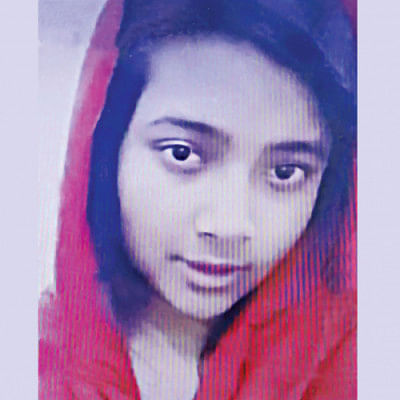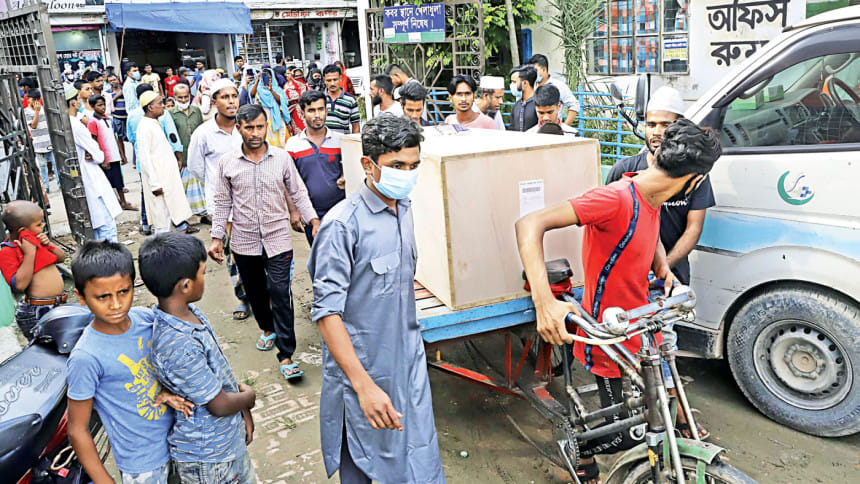That grim caravan just won’t stop

It was 4:00am yesterday when the first light of dawn was still far from the Dhaka sky.
Amid the predawn silence, heart-wrenching cries pierced through the Hazrat Shahjalal International Airport, as just hours ago the body of 13-year old Nodi arrived from Saudi Arabia.
Her family stood at the same place they saw her off but now they were receiving a coffin with her dead body inside.
Nodi was sent to the Gulf country last year as a domestic worker, but her passport falsely mentioned her age 25 -- the minimum age required for women to go Saudi Arabia.

The documents sent along with the body claimed Nodi died by suicide in August but her family claimed that she was either killed or forced to commit suicide after brutal torture.
"My daughter had been in trouble since she left for Saudi Arabia. We informed the recruiting agency repeatedly but they did not take any step. Now my daughter is gone. The documents said it was suicide but I found no scars on my daughter's neck. There were signs of torture all over her body," Nodi's mother Beauty Akhter said while crying.
"Who do I ask for justice?" she asked.
Nodi was buried in a Khilgaon graveyard after Zuhr prayers yesterday.
This tragic incident is not an isolated one.
Due to the Covid-19 pandemic this year, there have been complications over sending dead bodies to Bangladesh. A few were however able to make it to their motherland for burial.
According to the Expatriate Welfare Desk at Shahjalal Airport, bodies of at least 63 female migrants were sent to the country from January to September this year. Of them, 22 lost their lives in Saudi Arabia alone while 14 died in Lebanon, 11 in Jordan, seven in Oman, and four in the UAE.
Between 2016 and September this year, 473 bodies of female migrants, including the 63, were sent from different countries. Of them, 175 came from the Saudi Arabia.
Of the 175, 51 of them died by suicide.
An analysis reveals that at least 81 female migrants working in different countries died by suicide in the last four years. Of them, three died in 2016, 12 in 2017, 23 in 2018, 29 in 2019 and 14 this year.
Nodi was born on December 1, 2007, according to her family and birth certificate, but the date of birth mentioned in the passport was September 3, 1993. Although her family lives in Cumilla, the passport was issued from Mymensingh.
Nodi's case is almost identical to the other horrific tales of abuse of female migrants by their employers in the Middle East.
Her tragedy began after she reached Saudi Arabia last year, according to Nodi's mother Beauty and father Dulal Sheikh.
"The employer started torturing my daughter after she reached there. Even no salary was paid," said Beauty.
Nodi's father Dulal said they informed A Rahman Lalon, the owner of recruiting agency Dhaka Export (RL-275), time and again, but Dulal was threatened in various ways instead.
By the end of August, they learned that Nodi died by suicide after giving in to the torture, he said.
An official letter sent from the Bangladesh Embassy in Saudi Arabia to Dhaka on August 26 said that the embassy received information that Nodi had died by suicide in Medina on August 14.
The letter sought the family's opinion about her burial in Saudi Arabia. Nodi's family did not agree.
The embassy contacted Mansour al-Magamisi, owner of the Saudi recruiting agency, and informed him that Nodi had died by hanging herself.
A letter sent from the Wage Earners' Welfare Board to Saudi Arabia on September 2 said the family did not give permission for her burial there and they wanted her body sent back.
The family filed a case in this regard and Kalabagan police already arrested three people including A Rahman Lalon, the owner of the recruiting agency, on October 18.
Another 14-year-old, Kulsum, died on August 9 this year while undergoing treatment at the King Faisal Hospital in Saudi Arabia.
Like Nodi, her passport mentioned her age to be 25.
She was badly beaten by her employer, alleged her mother Nasima Begum, adding that her legs, arms and waist were broken and one of her eyes was damaged.
DEATHS IN QUESTION
Families of the dead migrant workers and experts say every death is a mystery.
Abirun Begum is a prime example.
She went to Saudi Arabia in July 2017 and was found dead at the employer's house.
Her family got the news of her death 51 days later. Her family members alleged her employer brutally tortured and killed Abirun.
The family never got due justice.
Similarly, Nazma went to Saudi Arabia through a local broker in December 2018. She was allegedly tortured and her dead body was sent to the country 53 days after her death.
Her family members alleged that she was promised a job in a hospital, but she was sent to a home instead. She was both tortured and sexually abused, they claimed.
Mosammat Begum went to Saudi Arabia in April 2019 through a recruiting agency and was found dead in Egypt.
According to the Bangladesh embassy in Egypt, Begum, a domestic help, died after falling from the rooftop of a five-storey building on May 29, 2019.
Her husband Abdul Aziz said he learnt that someone named Begum died in Egypt, but he did not take the matter seriously as his wife was in Saudi Arabia. Later, he got a call from Egypt and was told it was his wife.
Kamaluddin Ahmed Chowdhury, a teacher of clinical psychology department of Dhaka University, told The Daily Star, "A person never commits suicide under normal circumstances. What we see in Saudi Arabia is that most women were oppressed or faced a situation in which they thought suicide was the only way out."
"In fact, those who died by suicide found no other choice," he said.
The ordeals that the migrant workers, who somehow manage to survive even after the torture, are no less distressful.
In some cases, families of such victims do not want to accept them while many undergo severe mental trauma.
Runu Begum of Khulna is one of them.
She returned from Saudi Arabia on October 10 after suffering from a mental condition.
She was found aimlessly wandering the airport.
Airport Armed Police Battalion sent her to a non-government organisation.
The actual number of female migrant workers returning home from KSA is hard to calculate but it could surpass 10,000 in the last five years, according to embassies and various media reports.
According to a report of the expatriates' welfare and overseas employment ministry prepared on 110 female returnees from Saudi Arabia, 35 percent of them returned after being physically and sexually abused. Forty-four percent of them were not paid regularly.
The ministry sent the report to the parliamentary standing committee in August last year.
Contacted, Mohammad Shamsul Alam, director general of Bureau of Manpower, Employment and Training (BMET), said the ministry and BMET had issued a 12-point directive in December last year to ensure the safety of women workers and they are more careful about the issue.
Shamim Ahmed Chowdhury, secretary-general of the Association of International Recruiting Agencies (BAIRA), said yesterday that fingers are often pointed at the agencies for the incidents of repression or death of any worker in Saudi Arabia.
"But the crisis will not be solved unless measures are taken against the Saudis who persecute them. A mechanism should be developed to bring an end to the problem," he said.
The writer is a freelance journalist.
Log onto www.thedailystar.net for the full report.

 For all latest news, follow The Daily Star's Google News channel.
For all latest news, follow The Daily Star's Google News channel. 



Comments